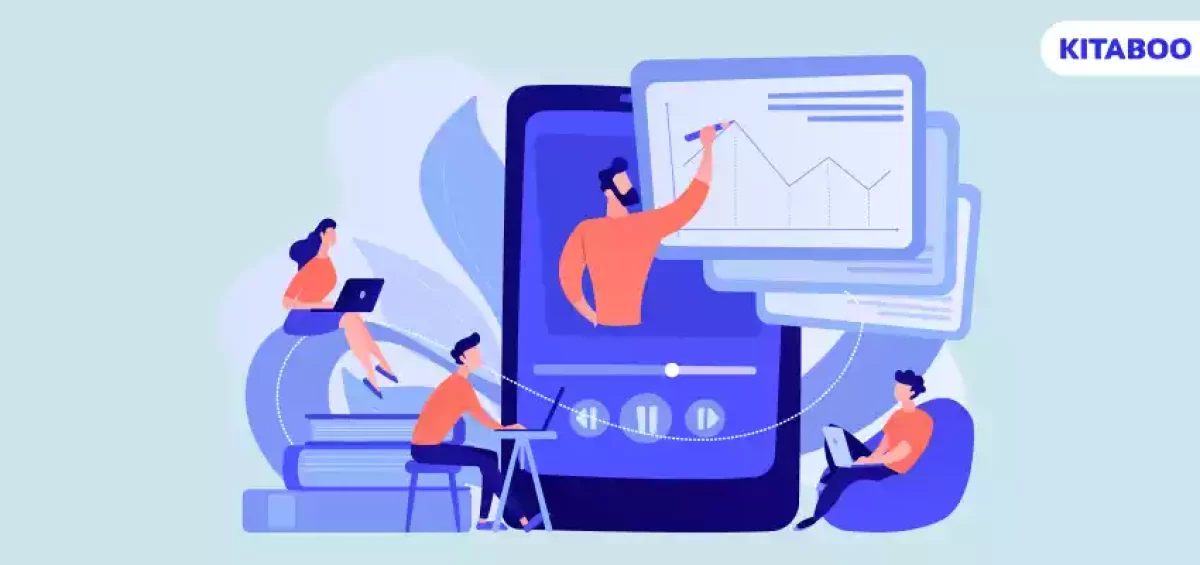Traditional corporate training ventures are beginning to prove ineffective in a competitive world that requires constant guidance and response to changing market dynamics. The rise of mobile corporate training apps enables on-the-go training and education, allowing professionals to learn on their own schedules and make the most of their time.
In this blog, we will discuss the power of mobile learning and explore the best corporate training apps for on-the-go education.
Table of Contents:
I. The Importance of Corporate Training Apps
II. The Power of Mobile Learning
- Flexibility and Convenience
- Remote Accessibility
- Microlearning
- Interactive and Engaging Content
- Real-Time Feedback and Progress Tracking
- Scalability and Cost-Effectiveness
The Importance of Corporate Training Apps
Corporate training apps serve as invaluable learning tools for organizations looking to develop a culture of continuous learning and development among their workforce. By providing employees with easy access to training content, corporate training apps allow individuals to take control of their professional growth. These apps offer a scalable and efficient solution for delivering training programs across teams and locations.
Personalized learning experiences, interactive content, and performance support allow these apps to create a positive learning environment that motivates employees to actively participate in their own development.
Engaged employees are more likely to be productive, satisfied, and loyal to their organization. Data-driven insights enable organizations to refine and optimize their training strategies and ensure that the learning initiatives they provide remain impactful and effective.
The Power of Mobile Learning
The mobile learning market is growing at a staggering rate, with Global Market Insights reporting a valuation of $46 billion in 2022 and a CAGR of 15% between 2023 and 2032. The implementation of mobile learning for corporate training provides the following benefits:
Flexibility and Convenience
Unlike traditional training methods, which require learners to be present at specific times and locations, mobile learning allows employees to access training content at their convenience. Learners can engage with training materials whenever they fit into their schedules. This flexibility enhances the learning experience and boosts productivity by reducing the need for dedicated training sessions.
Remote Accessibility
Mobile learning provides a solution for organizations with dispersed teams or remote employees who may not have easy access to traditional training facilities. Employees can use any mobile device on their person to engage with a host of training resources, regardless of their physical location.
This accessibility ensures that all employees, regardless of their circumstances, have equal opportunities for learning and development.
Microlearning
Microlearning is a facet of mobile learning that provides learning content in small-sized modules. Instead of overwhelming learners through long and tedious training sessions, mobile learning platforms can break down information into smaller segments. This approach to learning helps learners go through their training more efficiently when on the go and allows them to absorb information more effectively.
Snappier and smaller learning segments also keep learners engaged and motivated, leading to better retention and application of knowledge.
Interactive and Engaging Content
The best mobile training apps incorporate multimedia elements such as videos, interactive quizzes, and gamification to make training content more engaging and interactive. Traditional text-based materials can become hard to engage with over time, whereas interactive mobile learning provides a dynamic and immersive learning experience. Interactive elements not only capture attention more effectively but also encourage active participation and knowledge retention.
Simulations, case studies, and real-world scenarios in mobile learning apps make training content more engaging and provide a deeper understanding of the training material.
Real-Time Feedback and Progress Tracking
Mobile learning apps can implement features that provide learners with real-time feedback and progress tracking. This feedback loop allows learners to evaluate their understanding of the material and identify areas that require further training.
Quizzes, assessments, and performance analytics provide learners with data that helps them gauge their progress and adjust their learning strategies accordingly.
Corporate professionals can monitor learning progress remotely and provide any support and guidance as needed. This real-time feedback mechanism enhances the learning experience and encourages a culture of continuous improvement and skill development.
Scalability and Cost-Effectiveness
Implementing mobile learning solutions can be cost-effective for organizations compared to traditional training methods. By using existing technology and reducing the need for physical training locations, organizations can save on overhead costs associated with in-person training.
Mobile learning platforms allow organizations to accommodate a growing workforce without significantly increasing expenses. They can scale to meet the needs of organizations of all sizes, making them a cost-effective and scalable solution for corporate training.
The Best Corporate Training Apps
Let’s explore the best corporate training apps that help corporations facilitate on-the-go education:
KITABOO
Today’s corporate environments require highly specialized training and support, which large-scale training solutions might not always be able to provide. Apart from dealing with general training solutions, it might be best to create highly customizable and scalable training apps that allow organizations to have greater control over their corporate training material.
Digital textbook platforms such as KITABOO provide corporations with an all-in-one platform to create customizable and branded apps, allowing them to take charge of their corporate training initiatives and oversee the entire process with a high degree of control.
Udemy for Business
Udemy for Business is a popular online learning platform that offers thousands of courses on a diverse range of topics. With the Udemy app, employees can access these courses directly from their mobile devices. The app features a user-friendly interface and allows learners to download course materials for offline viewing, making it ideal for on-the-go learning. Learners can be trained on new software tools, improve their leadership skills, or make use of the vast training resources available.
LinkedIn Learning
LinkedIn Learning is a leading platform for online education, with a wide library of courses taught by industry experts. LinkedIn Learning provides personalized recommendations based on learner interests and career goals, and the LinkedIn Learning app makes it easy for employees to access courses from anywhere, with features like offline viewing and progress tracking. Corporations can find training courses for nearly every subject they require and improve the skill sets of their workforce.
Conclusion
The modern workforce is driven by a continuous desire to work on their skills and facilitate professional growth. Corporate training apps enable mobile learning and allow individuals to work on these aspects in an efficient manner, benefiting both employees and corporations alike.
Digital textbook platforms such as KITABOO provide corporations with an all-in-one platform to create customizable and branded apps, allowing them to take charge of their corporate training initiatives and oversee the entire process with a high degree of control.
To know more, connect with us now!
Discover How An Ebook Conversion, Publishing & Distribution Platform Can Help You
Kitaboo is a cloud-based content platform to create-publish & securely distribute interactive mobile-ready ebooks.
You May Also Like








